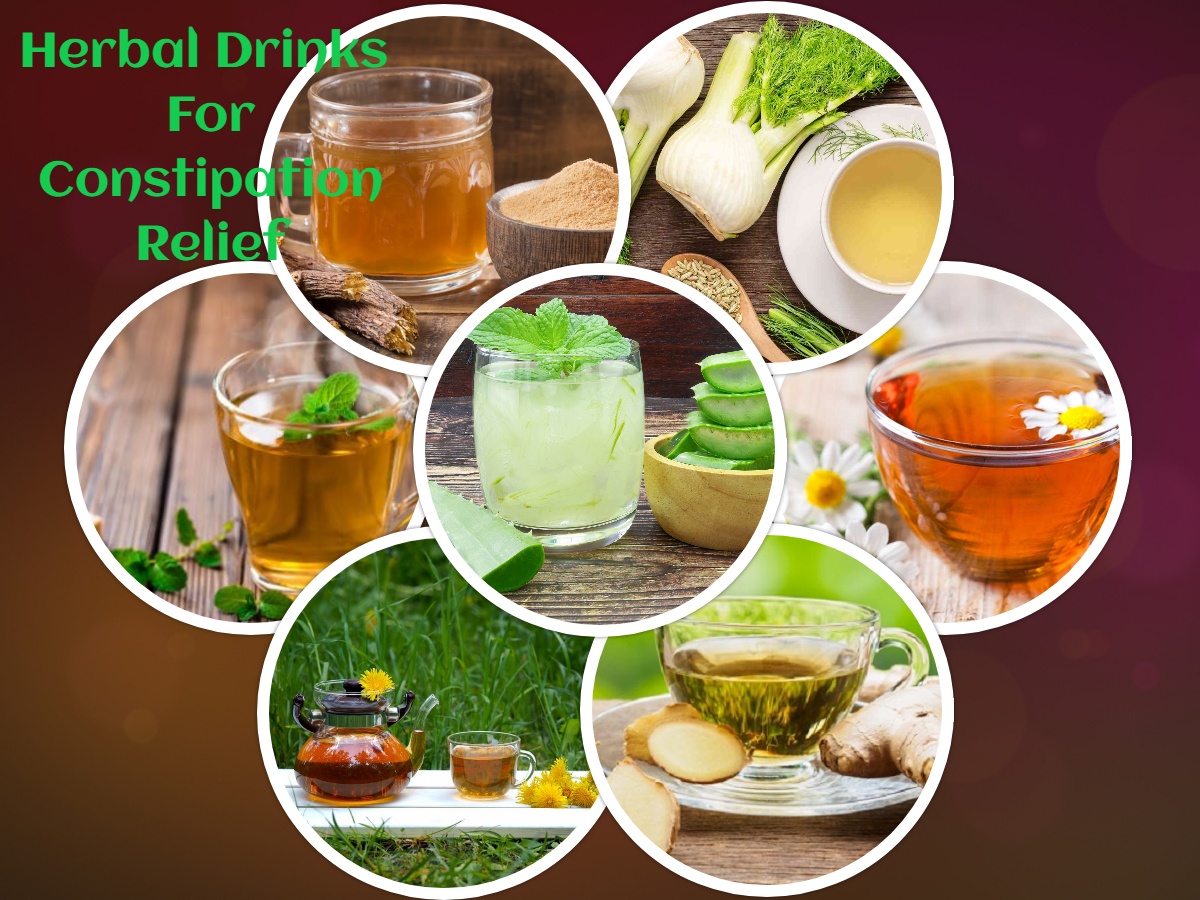Introduction:
Herbal Drinks for Constipation Relief!
Constipation is a common gastrointestinal issue that can cause discomfort and disrupt daily life. While there are various over-the-counter medications available for constipation relief, many people prefer natural remedies, such as herbal drinks, for a gentler approach.
Herbal drinks offer the dual benefit of alleviating constipation while also promoting better digestion.
In this article, we will explore some herbal drinks known for their effectiveness in relieving constipation and improving overall digestive health.
Contents:
Peppermint Tea:

- Peppermint tea is a popular herbal remedy for digestive issues, including constipation.
- It contains menthol, which has a soothing effect on the muscles of the digestive tract, helping to relieve spasms and promote bowel movements.
- Additionally, peppermint tea can help reduce bloating and gas, making it an excellent choice for overall digestive comfort.
Ginger Tea:
- Ginger has long been prized for its digestive benefits.
- Ginger tea stimulates digestion by increasing the production of digestive enzymes and promoting the movement of food through the digestive tract.
- Its anti-inflammatory properties can also help reduce inflammation in the intestines, easing constipation and discomfort.

Dandelion Root Tea:

- Dandelion root tea is rich in compounds called prebiotics, which promote the growth of beneficial bacteria in the gut.
- This can help improve overall digestive health and alleviate constipation.
- Dandelion root tea also acts as a gentle laxative, encouraging regular bowel movements without causing dependency.
Aloe Vera Juice:
- Aloe vera juice is well-known for its soothing properties, both internally and externally.
- When consumed, aloe vera juice can help soften stool and promote bowel movements, making it an effective remedy for constipation.
- It also contains enzymes that support digestion and help maintain a healthy balance of gut flora.

Chamomile Tea:

- Chamomile tea has been used for centuries as a natural remedy for digestive issues.
- It has anti-inflammatory and antispasmodic properties that can help relax the muscles of the digestive tract, easing constipation and cramping.
- Chamomile tea is also known for its calming effects, which can help reduce stress-related digestive symptoms.
Fennel Tea:
- Fennel seeds are rich in compounds that help alleviate digestive discomfort, including constipation, bloating, and gas.
- Fennel tea acts as a mild laxative, stimulating bowel movements and promoting regularity.
- It also has carminative properties, which means it can help prevent the formation of gas in the intestines.

Licorice Root Tea:

- Licorice root tea is another herbal remedy that can help relieve constipation and improve digestion.
- It contains compounds that have mild laxative effects and help regulate bowel movements.
- Licorice root tea also has anti-inflammatory properties, which can help reduce inflammation in the digestive tract and alleviate discomfort.
FAQs about Herbal Drinks and Constipation Relief:
- Are herbal drinks safe for relieving constipation?
- Herbal drinks can be safe and effective for relieving constipation for many people.
- However, it’s essential to choose the right herbs and consult with a healthcare professional, especially if you have underlying health conditions or are pregnant or breastfeeding.
- How quickly do herbal drinks work for constipation relief?
- The effectiveness of herbal drinks for constipation relief can vary from person to person.
- Some herbal remedies may produce results within a few hours, while others may take longer to take effect.
- It’s essential to be patient and consistent with herbal remedies for optimal results.
- Can I drink herbal teas if I’m taking medications?
- If you’re taking medications, it’s crucial to consult with your healthcare provider before incorporating herbal teas into your routine.
- Some herbs may interact with medications and affect their effectiveness or safety.
- Are there any side effects associated with herbal drinks for constipation relief?
- While herbal drinks are generally safe, some people may experience side effects such as allergic reactions, digestive upset, or interactions with medications.
- It’s essential to start with small doses and monitor your body’s response when trying new herbal remedies.
- How often should I drink herbal teas for constipation relief?
- The frequency of drinking herbal teas for constipation relief can vary depending on individual needs and preferences.
- Some people may find relief with daily consumption, while others may prefer to drink herbal teas as needed.
- It’s essential to listen to your body and adjust your intake accordingly.
- Can children drink herbal teas for constipation relief?
- Herbal remedies should be used with caution in children, and it’s essential to consult with a pediatrician before giving herbal teas to children, especially young children or infants.
- Are there any dietary or lifestyle changes that can complement herbal drinks for constipation relief?
- Along with drinking herbal teas, it’s essential to maintain a healthy diet rich in fiber, fruits, vegetables, and water.
- Regular exercise and stress management techniques can also support healthy digestion and alleviate constipation.
- Can I use multiple herbal remedies together for constipation relief?
- Using multiple herbal remedies together for constipation relief can be effective for some people.
- However, it’s essential to be mindful of potential interactions and consult with a healthcare professional before combining herbal remedies.
- How long can I use herbal drinks for constipation relief?
- Herbal drinks can be used for constipation relief as needed, but it’s essential to monitor your body’s response and make adjustments as necessary.
- If constipation persists or worsens despite herbal remedies, it’s important to seek medical attention.
- Where can I purchase herbal teas for constipation relief?
- Herbal teas for constipation relief are available at health food stores, specialty grocery stores, online retailers, and herbal apothecaries.
- It’s essential to choose high-quality, organic herbal teas from reputable sources for optimal effectiveness and safety.
Conclusion:
Herbal drinks offer a natural and gentle approach to relieving constipation and improving digestion. Incorporating these herbal remedies into your daily routine can help promote regularity, alleviate discomfort, and support overall digestive health. However, it’s essential to consult with a healthcare professional before using herbal remedies, especially if you have any underlying health conditions or are taking medications. With the right approach and guidance, herbal drinks can be an effective solution for digestive issues.









